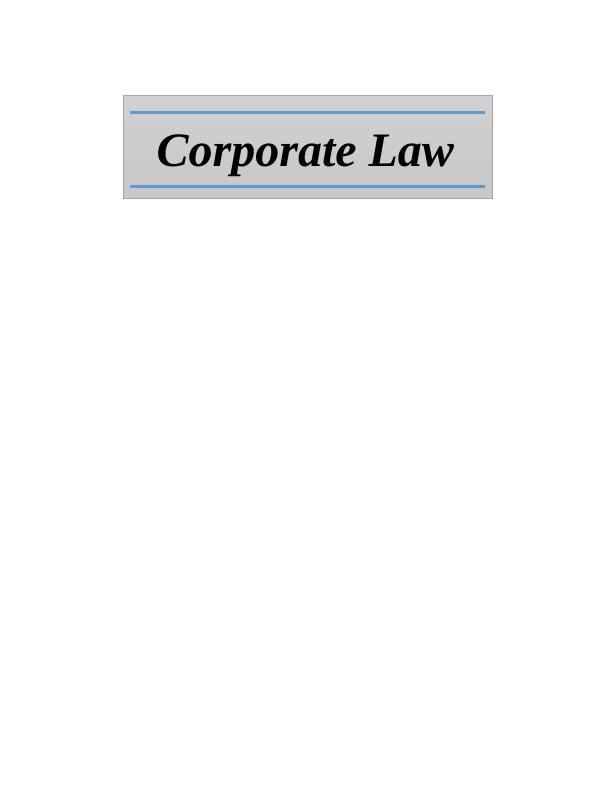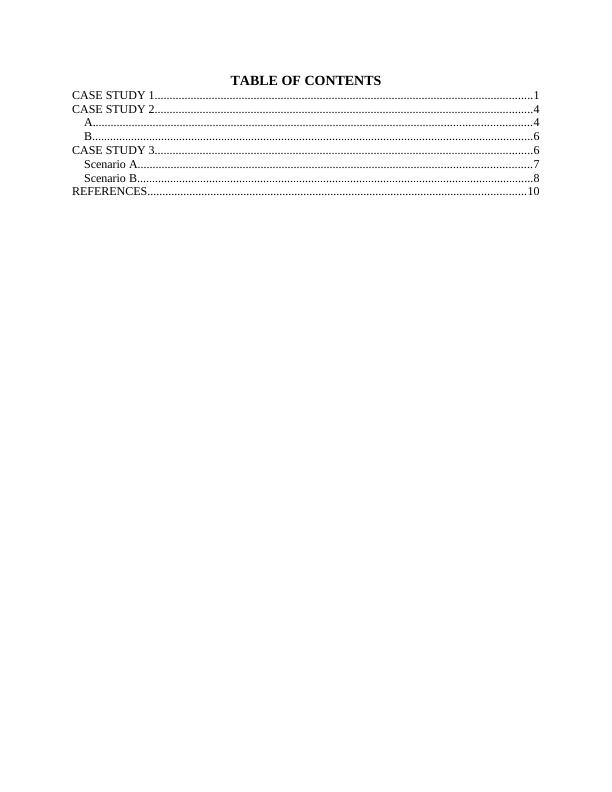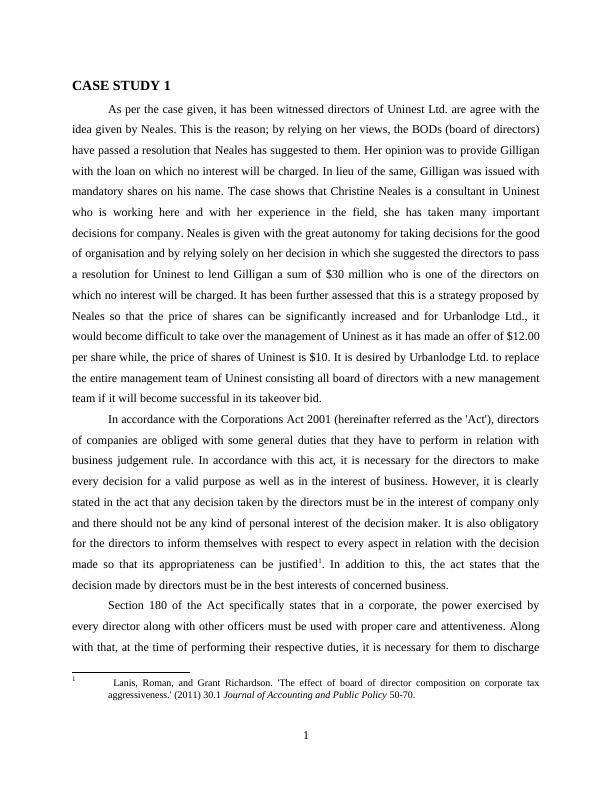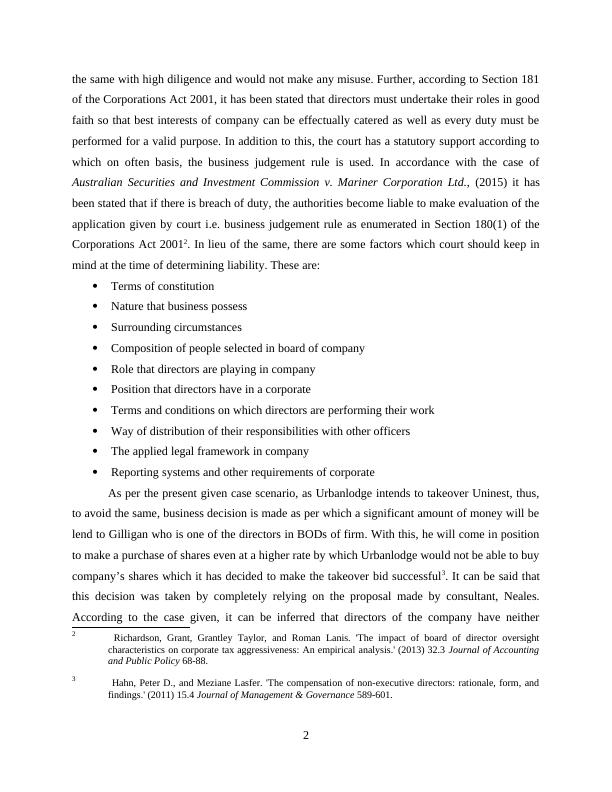Corporate Law Case Studies
Added on 2019-12-18
13 Pages4047 Words163 Views
Corporate Law

TABLE OF CONTENTSCASE STUDY 1..............................................................................................................................1CASE STUDY 2..............................................................................................................................4A..................................................................................................................................................4B...................................................................................................................................................6CASE STUDY 3..............................................................................................................................6Scenario A...................................................................................................................................7Scenario B....................................................................................................................................8REFERENCES..............................................................................................................................10

CASE STUDY 1As per the case given, it has been witnessed directors of Uninest Ltd. are agree with theidea given by Neales. This is the reason; by relying on her views, the BODs (board of directors)have passed a resolution that Neales has suggested to them. Her opinion was to provide Gilliganwith the loan on which no interest will be charged. In lieu of the same, Gilligan was issued withmandatory shares on his name. The case shows that Christine Neales is a consultant in Uninestwho is working here and with her experience in the field, she has taken many importantdecisions for company. Neales is given with the great autonomy for taking decisions for the goodof organisation and by relying solely on her decision in which she suggested the directors to passa resolution for Uninest to lend Gilligan a sum of $30 million who is one of the directors onwhich no interest will be charged. It has been further assessed that this is a strategy proposed byNeales so that the price of shares can be significantly increased and for Urbanlodge Ltd., itwould become difficult to take over the management of Uninest as it has made an offer of $12.00per share while, the price of shares of Uninest is $10. It is desired by Urbanlodge Ltd. to replacethe entire management team of Uninest consisting all board of directors with a new managementteam if it will become successful in its takeover bid. In accordance with the Corporations Act 2001 (hereinafter referred as the 'Act'), directorsof companies are obliged with some general duties that they have to perform in relation withbusiness judgement rule. In accordance with this act, it is necessary for the directors to makeevery decision for a valid purpose as well as in the interest of business. However, it is clearlystated in the act that any decision taken by the directors must be in the interest of company onlyand there should not be any kind of personal interest of the decision maker. It is also obligatoryfor the directors to inform themselves with respect to every aspect in relation with the decisionmade so that its appropriateness can be justified1. In addition to this, the act states that thedecision made by directors must be in the best interests of concerned business. Section 180 of the Act specifically states that in a corporate, the power exercised byevery director along with other officers must be used with proper care and attentiveness. Alongwith that, at the time of performing their respective duties, it is necessary for them to discharge1Lanis, Roman, and Grant Richardson. 'The effect of board of director composition on corporate taxaggressiveness.' (2011) 30.1 Journal of Accounting and Public Policy 50-70.1

the same with high diligence and would not make any misuse. Further, according to Section 181of the Corporations Act 2001, it has been stated that directors must undertake their roles in goodfaith so that best interests of company can be effectually catered as well as every duty must beperformed for a valid purpose. In addition to this, the court has a statutory support according towhich on often basis, the business judgement rule is used. In accordance with the case ofAustralian Securities and Investment Commission v. Mariner Corporation Ltd., (2015) it hasbeen stated that if there is breach of duty, the authorities become liable to make evaluation of theapplication given by court i.e. business judgement rule as enumerated in Section 180(1) of theCorporations Act 20012. In lieu of the same, there are some factors which court should keep inmind at the time of determining liability. These are:Terms of constitutionNature that business possessSurrounding circumstancesComposition of people selected in board of companyRole that directors are playing in companyPosition that directors have in a corporateTerms and conditions on which directors are performing their work Way of distribution of their responsibilities with other officersThe applied legal framework in companyReporting systems and other requirements of corporate As per the present given case scenario, as Urbanlodge intends to takeover Uninest, thus,to avoid the same, business decision is made as per which a significant amount of money will belend to Gilligan who is one of the directors in BODs of firm. With this, he will come in positionto make a purchase of shares even at a higher rate by which Urbanlodge would not be able to buycompany’s shares which it has decided to make the takeover bid successful3. It can be said thatthis decision was taken by completely relying on the proposal made by consultant, Neales.According to the case given, it can be inferred that directors of the company have neither2Richardson, Grant, Grantley Taylor, and Roman Lanis. 'The impact of board of director oversightcharacteristics on corporate tax aggressiveness: An empirical analysis.' (2013) 32.3 Journal of Accountingand Public Policy 68-88.3Hahn, Peter D., and Meziane Lasfer. 'The compensation of non-executive directors: rationale, form, andfindings.' (2011) 15.4 Journal of Management & Governance 589-601.2

End of preview
Want to access all the pages? Upload your documents or become a member.
Related Documents
BX3173:03 Strategic Entrepreneurshiplg...
|14
|3384
|150
Case Study Corporate Law Assignmentlg...
|12
|3943
|463
Corporate Law Assignment : Uninest Limitedlg...
|13
|3072
|2
Corporate Lawlg...
|11
|3576
|220
Commercial Law Case Studies: Breach of Director's Dutieslg...
|9
|2938
|481
Breaching Directors' Duties in Corporate Lawslg...
|12
|2885
|336
